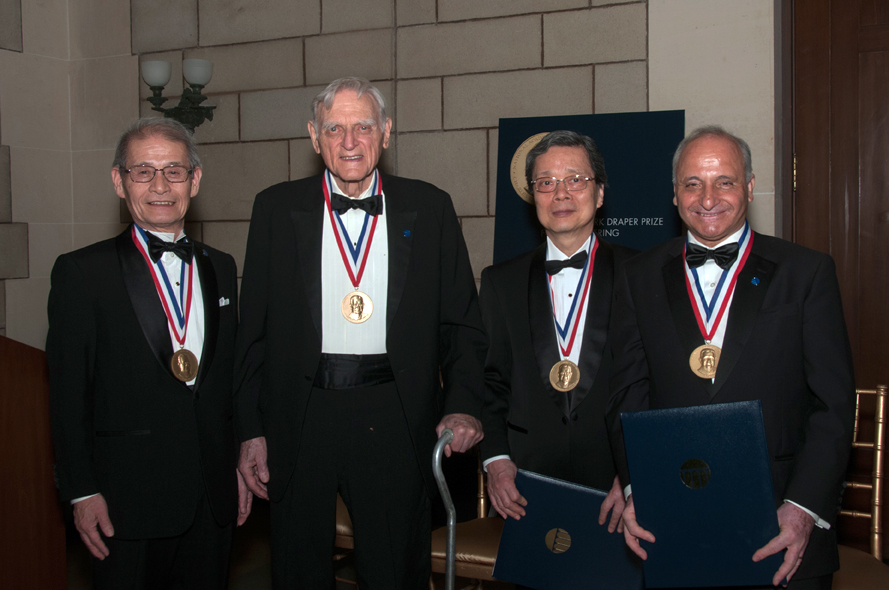John Goodenough Wins Engineering’s Highest Honor for Pioneering Lithium-Ion Battery

Left to right: Akira Yoshino, John B. Goodenough, Yoshio Nishi and Rachid Yazami standing together after receiving the Draper Prize for Engineering.
The National Academy of Engineering (NAE) will bestow John B. Goodenough of The University of Texas at Austin with the highest honor in the engineering profession for the groundbreaking creation of the lithium-ion battery.
Goodenough holds the Virginia H. Cockrell Centennial Chair in Engineering in the Cockrell School of Engineering. He is one of four recipients of this year’s Charles Stark Draper Prize for Engineering in recognition of their significant roles in developing the lithium-ion battery, which is used by millions of people around the world in devices such as cellphones, laptops, tablets, hearing aids, cameras, power tools and many other mobile electronics.
Goodenough, Yoshio Nishi, Rachid Yazami and Akira Yoshino will receive the Draper Prize “for engineering the rechargeable lithium-ion battery that enables compact, lightweight mobile devices.” They will share the $500,000 annual award that honors engineers whose accomplishments have significantly benefited society.
The prize will be presented at a gala event in Washington, D.C., on Feb. 18. This year marks the 25th anniversary of the Draper Prize. In addition to the Draper Prize, NAE will also award the Bernard M. Gordon Prize for Innovation in Engineering and Technology Education at the gala.
“The NAE’s major prizes for 2014 highlight the dramatic impacts of engineering innovations on people and society, and they inspire new ideas about educating the next generation of great innovators,” said C.D. Mote Jr., president of the National Academy of Engineering, a 50-year-old group that has more than 2,000 peer-elected members and foreign associates. “I congratulate the prize winners on their achievements, and thank them on behalf of all beneficiaries of their creativity.”
In 1979, Goodenough showed that by using lithium cobalt oxide as the cathode of a lithium-ion rechargeable battery, it would be possible to achieve a high density of stored energy with an anode other than metallic lithium. This discovery led to the development of carbon-rich materials that allow for the use of stable and manageable negative electrodes in lithium-ion batteries.
Goodenough began his career at the Massachusetts Institute of Technology’s Lincoln Laboratory in 1952, where he laid the groundwork for the first random-access memory (RAM) of the digital computer. After leaving MIT, he became a professor and head of the Inorganic Chemistry Laboratory at the University of Oxford. During this time, Goodenough made the lithium-ion discovery.
In 1986, he took the Virginia H. Cockrell Centennial Chair of Engineering at UT Austin. He holds faculty positions in the Department of Mechanical Engineering and the Department of Electrical and Computer Engineering.
In 2013, Goodenough was awarded the 2011 National Medal of Science for his lasting contributions to materials science and technology. He also holds the Japan Prize, which he received in 2000.
